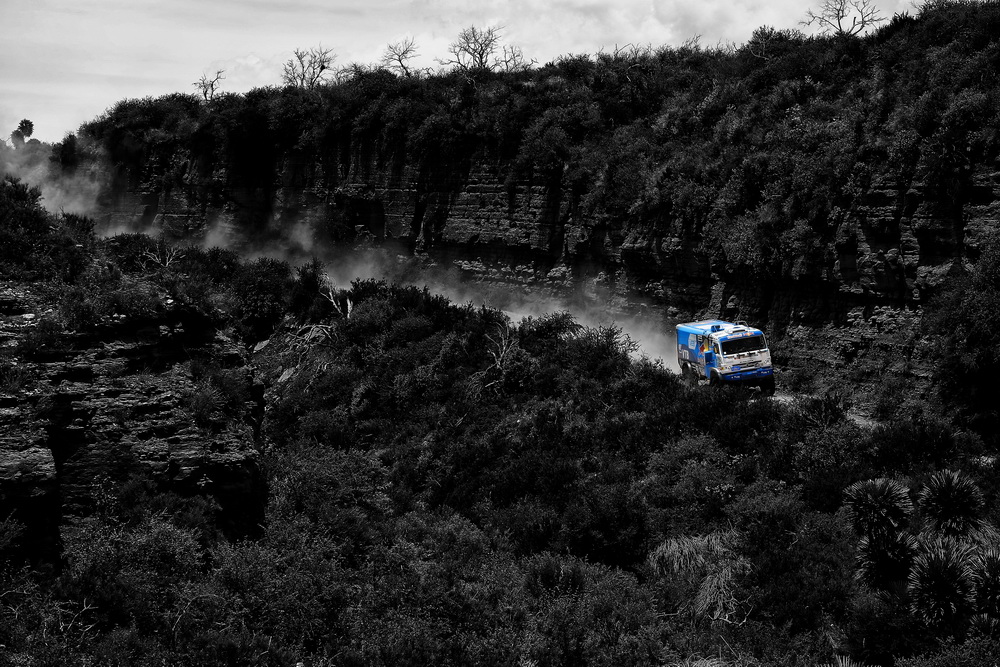
San Salvador de Jujuy, 5 January
Once again the fourth day of Dakar changed plans of the organizers and the sportsmen. Due to heavy rains the race director Etienne Lavigne decided yesterday to shorten today’s special for car and truck categories from 314 km to 190 km. Trucks started at 12:58, but just at 13:16 the race authorities informed about the special shortening because of bad weather conditions and impossibility for trucks to go.on. However, on bivouac nobody could tell exactly from what point the results will be counted. But it was already clear that the unluckiest are those who started the special section the latest. A heavy rain shower caught trucks during their drive and after cars the route turned into a mud bath. It seemed that the question cleared when monitors in the press centre showed the information about the best result of the day by the Czech Martin Kolomy from Tatra Buggyra Racing team. The finish had been organized at CP3, the factual length of the special turned to be about 130 km. Only the results started to change in a ‘mysterious’ way. Airat Mardeev who had lost approximately two minutes to Martin Kolomy, suddenly occurred in top 20 of standings, with the gap of almost half an hour with the leader.
Airat Mardeev commented the situation in the following way: “It looks like a failure in the counting connected with the cut of the special. The finish was moved to CP3. We saw our result at the finish line, saw our gap with the leader – a bit above two minutes. There was no navigation at the stage, so there couldn’t be mistakes. We didn’t stop. We managed to beat Loprais, so the tempo was not bad. Therefore after the finish we were surprised to know that we were half an hour behind the leader. We began to think of penalties. We did not have any. In my opinion, it is a failure in the counting system.”
Eduard Nikolaev’s crew also had an adventurous stage. “In view of the rain we tried to drive carefully, - told the driver of 502 crew. - We tried to increase the speed a bit in order to improve yesterday’s results. On the 20th kilometer we didn’t expect it to be so slippery and on turn our truck was pulled off the road. We were already going up the foothill, where water was flowing in impetuous streams and it became really greasy. We were lucky not to have hurt ourselves and we also didn’t damage the truck and wheels. Bushes and branches prevented us from falling down. Luckily, Andrey Karginov’s truck was following us. The help of one vehicle was enough to return us to the road. We lost around seven minutes on the place. Dima Sotnikov stopped, too, but his help was already unnecessary.”
Andrey Karginov remarked that it was difficult to drive the truck in such weather: “You need to realise that KAMAZ picks up the speed as fast as a car , but due to large mass it is very inert at braking. There were sharp curves on the route. One has to have an experience to drive in such conditions. However, on our Russian Championships it often rains, therefore we have this experience. Today we will do some important repair and preparatory works before the forthcoming two rally stages. Rain water ran ankle-deep on the bivouac. Conditions are difficult but we need to be strong.”
Dmitry Sotnikov’s crew was not as far as we wished it to be because of the breakdown which might have happened in the oceans of mud on the timing section. “Air bound was punctured. There was an air leak. There was pressure in one section, but there was a poor pumping in the second one. We decided not to expend time for repair and continue drive, because we didn’t know exactly what had happened. We had to seek for the reason. We were driving carefully, as we almost didn’t have brakes due to the lack of pressure,” – told Dmitry Sotnikov after the finish.
There was a traditional meeting on bivouac that evening, in the end of which warm words were said to greet the leader of the team Vladimir Chagin and the driver of the team’s “auto hotel” Foat Bigashev happy birthday.
By the time of writing the report, there still were no final results of the 3rd stage in the truck category.
In the morning of 6 January the whole assistance team will leave bivouac in Jujuy and head to the bivouac in the Bolivian border town Tarija. After a circular stage sport crews will come back to Jujuy, where trucks are left in the closed park with no entry and possibility to repair. That is an idea of the Dakar Rally stage which finishes on 7 January in Bolivian town Uyuni.